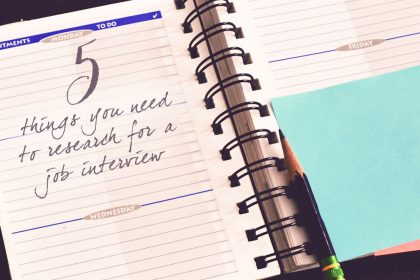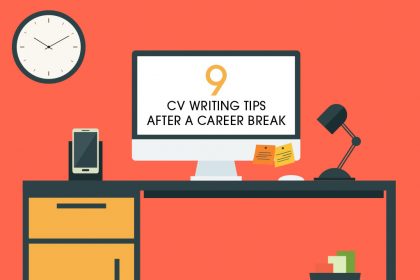How to talk your way into the job you want
Have you seen an amazing job you’d love to go for, but you don’t quite match the requirements? Learn how to talk your way into the job you want – even if you’re not a perfect fit on paper.
Last year I wrote an article for The Guardian, How to get a job without any relevant experience. In it I explained how I landed my first copywriting job (and launched a successful, award-winning advertising career) by talking my way into a position I was neither experienced in nor qualified for.
And I was completely surprised by the reaction to it. The number of people and organisations who got in touch to ask how I did it, or to share stories of how women are so often held back because they don’t have the confidence to talk themselves up shocked me.
Are we holding ourselves back?
You see, it turns out that when it comes to the two exes, women are much less likely to go for a job they’re not a perfect match for. And, in fact, as much as we may often believe that it’s having children that has held women back in the workplace, and kept us under that famous glass ceiling, research shows that it’s just as likely to be how we talk about and present ourselves.
Research last year by Directors UK, the professional association of directors working with the moving image in the UK, revealed that starting a family isn’t the reason why women are under-represented in TV and movie directing.
In fact, the shift to a more male-driven market actually happens earlier. Men are, apparently, more confident in pushing themselves forward for ambitious opportunities, and reaching beyond the boundaries of their comfort zone.
Women are less likely to talk themselves up
One reason for this may be our natural reluctance to push ourselves forward or talk ourselves up. As we explain in our article Three words you should never use to describe your work or business (interestingly, the most popular article we have ever published on our site), women aren’t always good at selling themselves.
In fact, we often do the opposite – diminishing our achievements either to avoid appearing to boast, or to make others feel better about their own achievements. Or perhaps because we simply don’t give ourselves full credit for the amazing things we do.
As Employment Minister Esther Mcvey says:
“I thought it was very revealing that head-hunters check through a woman’s CV for something like 25 minutes to analyse because the chances are she will play down her achievements.
Whereas it can take two-and-a-half hours to check a bloke’s because they’ll write about things as if they have done them, when in fact that would be a promotion.”
Another reason is that we simply lack the confidence that we can actually DO something that is beyond our existing experience, or don’t want to be exposed as a fraud, and as a result prefer to play safe and only talk about what we’ve done – and not what we could potentially do if we were brave enough to risk it.
How to talk your way into the job you want
So what can we do? How can we overcome our natural modesty and fears, and learn to talk our way into the job we want – even if our qualifications or experience isn’t a perfect fit for it right now?
To help you learn to talk your way into your ideal job (even if it’s a big leap up), here are some tips that have worked for me – and helped me to launch my career as a copywriter.
1) Understand what employers are looking for
The first thing you need to do is really understand what an employers is looking for. Your starting point is in the ad you are responding to, or the brief they’ve given to their recruiters.
Usually there will be a list of attributes or qualifications their ideal candidate would have, and this is certainly worth checking out to see how many apply to you.
Make sure, wherever possible, that you use language and titles from their recruitment ad or brief in your CV or application letter so they match up, and a potential employer can see you have the experience they need.
2) But don’t let it put you off
But don’t let their list put off if you’re not a perfect match. In reality, there are many more factors at play than a simple list of qualifications or experience.
Beyond essential factors that would prevent you from doing the job (there is no way in the world you could or should try and talk your way into a job as a doctor, for example, if you’re not qualified as one!), many of the ideal qualities they list are often up for negotiation.
You see, employers hire people, not CVs. And given the choice between a candidate with the right attitude but lacking the ideal experience, and one who could do the job with ease tomorrow but has the wrong personality, most employers would opt for the candidate lacking experience.
Why? Because you can teach skills and gain experience, but you can’t ‘learn’ the right character. So don’t be put off by long lists of requirements you don’t perfectly meet. If you believe you can do a position and are right for the company, find a way to secure an interview and show that you’re the ideal fit.
3) Spend time on your CV
Before you even get an opportunity to talk your way into a job, you need to secure an interview. And for this you’ll need a fantastic application letter or email and CV.
We always recommend tailoring your application letter and CV for every position you apply for, and taking the time to get it absolutely right. If you need help, you’ll find some tips to perfect your CV and cover letter in these articles:
- How to write the perfect job application letter.
- Six expert HR tips to get your CV noticed.
- 10 common CV mistakes – and how to avoid them.
- How to make your CV look better.
- How to tidy up your CV in less than half an hour.
4) Prepare for a successful interview
Turning up for an interview unprepared could leave you struggling to answer even the most basic questions about the company you want to work for. And that is definitely NOT the way to impress!
So make sure you prepare well for your interview by researching the company and industry (you can read the five things you need to research here) and generally taking wise measures to ensure you’re as prepared as you can be.
5) Visualise the interview you want
In the week before your interview (or however many days notice you have) start to visualise your interview going just as you’d like it to. Create a video in your head, starting with you leaving your home, looking and feeling confident.
Imagine yourself meeting your interviewer and saying all the right things with conviction and ease. Picture your interviewer’s impressed response and think of all the positive and authentic things you are going to say about yourself. How passionate you are about the position. What you can bring to the job. And what makes you perfect for it.
Create the vision of the ideal job interview and replay this over and over before the actual day (I find the best time to do is in bed, just before I go to sleep). In doing so, you will create a kind of blueprint for your mind to follow on the actual day.
Don’t underestimate the power of this technique – it’s used to great effect by sports stars, public speakers and therapists to get the results they want.
6) Practise your body language
Once you’ve secured an interview and prepared well for it, all that is left to do is shine. And the first opportunity you get to do that is when you walk in the room confidently and greet your interviewer.
To help you practise good, confident body language, we’ve put together some quick tips for you:
- Keep good eye contact.
- But don’t stare.
- Don’t slouch.
- Smile when appropriate.
- Use your hands to make confident gestures.
- But don’t point aggressively.
- Nod occasionally but not excessively.
- Don’t cross your arms.
- Or keep them behind your back.
- Keep them in your lap when using them.
- Don’t touch your face.
- Or bite your nails.
- Try not to fidget.
It’s also a good idea to mirror the body language of your interviewer. This doesn’t mean copy them completely – that will look storage or even mocking. Instead, try to naturally use similar gestures and even tone of voice. This helps to unconsciously communicate that you are similar to them, or on the same wavelength.
You can also pick up on words and language patterns they sue, and reflect them back in your own language.
If you don’t naturally mirror people, it’s worth practising the skill before your interview. It needs to be subtle and natural – not obvious and forced – to work.
7) Avoid saying no!
There are bound to be moments in an interview when you’ll be asked if you have a particular experience or qualification that you haven’t yet acquired – especially if you’re interviewing for a position that’s a step up for you. And the obvious answer to the question is a simple, “No”.
But wherever possible, avoid using this word. It’s a negative dead end, and cuts dead a perfect opportunity to sell yourself, and turn a potential cross into a positive.
So what can you say instead? Here are a few suggestions, depending on the question:
- I haven’t got that qualification yet, but I would love to, given the opportunity.
- I have never used that skill before but I am keen to try.
- I haven’t done that yet, but I am an enthusiastic and quick learner.
- I have never heard of that, can you tell me more about it?
Do you see a pattern here? Rather than cutting a conversation off at ‘no’. you create a possibility of a future (haven’t done it ‘yet’) and demonstrate your enthusiasm and ambition.
You can also deftly turn the conversation to something that you DO have by saying something like, “I haven’t done that, but I have…”. This enables you to move onto a topic of conversation that showcases other skills.
This also conveys confidence and capability – you’re not foxed or frightened by tough questions, and instead can confidently highlight what you are good at, without bragging or lying. And if you can do that for yourself, you’ll be able to do that for an employer.
Don’t overlook the power of these tips
These may seem quite simple tips, but it’s the very strategy that enabled me to talk my way into a job as a copywriter with one of the world’s top advertising agencies without a single shred of experience.
Having managed to wangle an interview for the job I wanted, I realised quite quickly (by reading my interviewer’s body language) that he wasn’t interested. He needed someone with experience, who could walk in and do the job tomorrow, and I blatantly wasn’t that person.
But I was determined – and believed I could do the job given a chance – and confidently told the interviewer what I hoped he wanted to hear. I knew enough about the role of a copywriter from my research, and explained with passion why I would be perfect at it, and showed how I had the right personality for the job.
As a result, the interviewer decided to set me a test – and hired me after I passed it. And the rest is history!
If I can do it, you can too!
I wasn’t qualified or experienced to land a role as copywriter with an international ad agency. So if I could talk my way into that role, then so can you with a job you really, really want, but on paper are not the perfect fit for.
All you need to do is lose any natural female modesty or self-doubt that may be holding you back, and go for it. After all, what’s stopping you?










